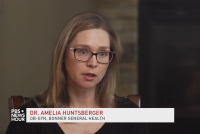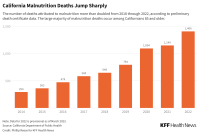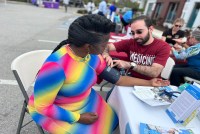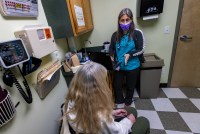Latest KFF Health News Stories
After Idaho’s Strict Abortion Ban, OB-GYNs Stage a Quick Exodus
At least two Idaho hospitals are ending labor and delivery services, with one citing the state’s “legal and political climate” and noting that “recruiting replacements will be extraordinarily difficult” as doctors leave.
What the Health? From KFF Health News: Dancing Under the Debt Ceiling
House Republicans passed their plan to raise the nation’s debt ceiling, along with major cuts to health (and other domestic) programs. Unlikely to become law, it calls for new work requirements for adults on Medicaid. Meanwhile, state efforts targeting trans people bear a striking resemblance to the fight against abortion rights. Jessie Hellmann of CQ Roll Call, Shefali Luthra of The 19th, and Sarah Karlin-Smith of the Pink Sheet join KFF Health News chief Washington correspondent Julie Rovner to discuss these issues and more. Also this week, Rovner interviews Renuka Rayasam, who reported the latest KFF Health News-NPR “Bill of the Month” feature, about a specialist’s demand to be paid as much as $15,000 before treating a woman’s serious pregnancy complication.
Expectant Mom Needed $15,000 Overnight to Save Her Twins
Doctors rushed a pregnant woman to a surgeon who charged thousands upfront just to see her. The case reveals a gap in medical billing protections for those with rare, specialized conditions.
How a 2019 Florida Law Catalyzed a Hospital-Building Boom
In Wesley Chapel, Fla., near Tampa, residents will soon have three general hospitals within a five-minute drive. The new construction is part of a hospital-building boom across Florida unleashed almost four years ago, when the state dropped a requirement that companies obtain government approval to open new hospitals.
What the Health? From KFF Health News: Will They or Won’t They (Block the Abortion Pill)?
The Supreme Court is considering the future of the abortion pill mifepristone, after GenBioPro sued the FDA over limitations that effectively block generic production of the drug, a major part of the market. Congress is considering proposals that would impose Medicaid work requirements, crack down on pharmacy benefit managers, and more. And President Joe Biden moved to expand health coverage to young immigrants known as “Dreamers.” Rachel Cohrs of Stat, Sandhya Raman of CQ Roll Call, and Joanne Kenen of the Johns Hopkins Bloomberg School of Public Health and Politico join KFF Health News’ Mary Agnes Carey to discuss these issues and more.
An Arm and a Leg: A $229,000 Medical Bill Goes to Court
Lisa French was told her surgery would cost $1,337. But the hospital sent her a bill for $229,000, then sued her. The case went all the way to the Colorado Supreme Court. The court’s ruling could have major implications for determining a “reasonable price” in health care.
A Smart Move on Tax Day: Get Health Insurance Information Using Your State’s Tax Forms
A growing number of states — including Maryland, Colorado, and Massachusetts — are using tax forms to point people toward lower-cost health coverage available through state insurance marketplaces.
What the Health? From KFF Health News: The Confusing Fate of the Abortion Pill
The legality and availability of the abortion pill mifepristone is in question after a federal judge in Texas canceled the FDA’s approval of the first drug used in the two-drug medication abortion regimen. A 5th Circuit Court of Appeals panel overruled that decision in part, saying the pill should remain available, but only under the onerous restrictions in place before 2016. Meanwhile, another federal judge in Washington state issued a ruling in a separate case that conflicts with the Texas decision, ordering the FDA not to roll back any of its restrictions on the drug. Victoria Knight of Axios, Shefali Luthra of The 19th, and Sarah Karlin-Smith of the Pink Sheet join KFF Health News chief Washington correspondent Julie Rovner to discuss these issues and more.
The Rate of Older Californians Dying of Malnutrition Has Accelerated
Californians 85 and older are especially susceptible to malnutrition. They accounted for almost three in five malnutrition deaths in the state last year.
Most Americans Say They or a Family Member Has Experienced Gun Violence
More than 1 in 5 Americans report having been threatened with a firearm, and almost as many say they worry about gun violence every day or almost every day, a new KFF poll shows.
Watch: Rulings on Abortion Pill Have Far-Reaching Repercussions
Sarah Varney, a senior correspondent for KHN, joins Ali Rogin of PBS NewsHour to discuss the ruling by a federal judge in Texas that threatens nationwide access to the widely used abortion drug mifepristone, and a separate ruling in Washington state that reached the opposite conclusion.
High Inflation and Housing Costs Force Many Americans to Delay Needed Care
A recent Gallup Poll suggests that Americans are putting off medical care because of costs. Inflation and rising rents make it harder for people to make ends meet.
What the Health? From KFF Health News: The ‘Unwinding’ of Medicaid
As of April 1, states were allowed to begin reevaluating Medicaid eligibility for millions of Americans who qualified for the program during the covid-19 pandemic but may no longer meet the income or other requirements. As many as 15 million people could lose health coverage as a result. Meanwhile, the Medicare Hospital Insurance Trust Fund is projected to stay solvent until 2031, its trustees reported, taking some pressure off of lawmakers to finally fix that program’s underlying financial weaknesses. Alice Miranda Ollstein of Politico, Rachel Roubein of The Washington Post, and Amy Goldstein of The Washington Post join KHN’s Julie Rovner to discuss these issues and more. Also this week, Rovner interviews Daniel Chang, who reported the latest KHN-NPR “Bill of the Month” feature about a child not yet old enough for kindergarten whose medical bill landed him in collections.
An Arm and a Leg: A Doctor’s Love Letter to ‘The People’s Hospital’
Could a charity hospital founded by a crusading Dutch playwright, a group of Quakers, and a judge working undercover become a model for the U.S. health care system? In this episode of the podcast “An Arm and a Leg,” host Dan Weissmann speaks with Dr. Ricardo Nuila to find out.
In Texas, Medicaid Coverage Ends Soon After Childbirth. Will Lawmakers Allow More Time?
Pregnancy-related Medicaid coverage ends just two months after childbirth in Texas — some advocates and researchers say that cutoff contributes to maternal deaths and illnesses in the state.
What the Health? From KFF Health News: A Judicial Body Blow to the ACA
A federal judge in Texas has dealt a big setback to the Affordable Care Act. The same judge who tried in 2018 to declare the entire ACA unconstitutional has now ruled that the law’s main provisions for preventive care are unconstitutional and, therefore, unenforceable nationwide. Also this week, North Carolina became the 40th state to expand Medicaid under the ACA. Alice Miranda Ollstein of Politico, Rachel Cohrs of Stat, and Sandhya Raman of CQ Roll Call join KHN chief Washington correspondent Julie Rovner to discuss these issues and more.
$50 Billion in Opioid Settlement Cash Is on the Way. We’re Tracking How It’s Spent.
Spending the money effectively and equitably is a tall order for state and local governments, and a lack of transparency in the process is already leading to fears of misuse.
Sen. Sanders Shows Fire, but Seeks Modest Goals, in His Debut Drug Hearing as Health Chair
The Vermont independent and former presidential candidate was all fire and brimstone at his first hearing on drug prices as head of the Senate HELP Committee. He also pursued a more modest goal of covid vaccine price reductions. It isn’t clear whether Sanders will succeed in even that, but he has put affordability front and center.
What the Health? From KFF Health News: The Policy, and Politics, of Medicare Advantage
Medicare Advantage, the private plan alternative to traditional Medicare, is embroiled in a growing controversy over whether insurers are being overpaid and what it would mean to reduce those payments. Meanwhile, even as maternal mortality in the U.S. continues to rise, providers of care to pregnant women say they’re leaving states with abortion bans that prevent them from treating pregnancy complications. Margot Sanger-Katz of The New York Times, Jessie Hellmann of CQ Roll Call, and Joanne Kenen of the Johns Hopkins Bloomberg School of Public Health and Politico join KHN’s chief Washington correspondent Julie Rovner to discuss these issues and more.
Some Roadblocks to Lifesaving Addiction Treatment Are Gone. Now What?
The federal government has lifted restrictions on one of the most effective opioid addiction treatment medications. The change sets up a “truth serum moment”: Will mainstream doctors and nurses now treat addiction as a common disease?






















